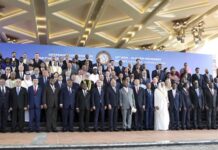With the EU and the African Union (AU) and their member states gearing up for a summit in Brussels on Thursday and Friday, the EU’s ambition to beef up its presence in the African continent with the unfolding of its infrastructure push known as the Global Gateway is in focus.
Considering the EU and the US, advancing their African agenda based on an “imaginary” rivalry with China, experts urged the EU to genuinely contribute to the African modernization progress by teaming up with China.
The summit aims to launch “an ambitious Africa-Europe Investment Package,” according to the summit agenda posted on the website of the European Council, the EU’s main decision-making body. Among the topics to be discusses at the roundtable sessions of the summit are growth financing, connectivity and infrastructure.
Prior to the summit, European Commission President Ursula von der Leyen announced funding of more than 150 billion euros ($170.52 billion) via the Africa-Europe program in a statement earlier in February following her meeting with Senegalese President Macky Sall.
“This is the first regional plan under Global Gateway, two months after the launch of the strategy,” said von der Leyen.
Africa has the world’s youngest population and a sizable workforce. With trading under the African Continental Free Trade Area up and running at the beginning of 2021, which put in place a unified market in the continent, Africa has become an investment-worthy emerging market for global investors, experts said.
Nonetheless, an increasing focus on the African market in the case of the EU and the US is considered much of a response to what they deem as “external competition” from China, they noted.
While the attractiveness of the African market warrants increased attention from the EU and the US, as evidenced by a package of investment plans unveiled by the EU, the traditional powers are shown to be upping the ante in the continent in an effort to hedge against competition from China, their “imaginary enemy,” Song Wei, a research fellow at the Chinese Academy of International Trade and Economic Cooperation, told the Global Times on Thursday.
In the words of Song, “the most direct reason behind rising US and European interest in Africa is their intention to go head-to-head with China.”
By stark comparison, the China-proposed Belt and Road Initiative (BRI) is a massive global development program that’s aimed at propping up developing economies, the expert noted.
China’s total trade with Africa soared 35.3 percent year-on-year to $254.29 billion in 2021, Chinese customs data showed.
In a fresh sign of bilateral tie-ups, the new headquarters of the Commercial Bank of Ethiopia, the tallest building in East Africa built by Chinese contractors, was officially completed on Sunday. The new building is located in the core business area of Addis Ababa, the capital of Ethiopia, with a total construction area of more than 160,000 square meters and a height of 209.15 meters.
Construction of the project, built by China State Construction through a multi-year effort beginning in July 2015, has provided more than 3,000 local jobs.
The record-smashing new building typifies the rising profile of the Chinese business community in consolidating ties between China and Africa.
Chinese businesses, through their investments in Africa, have made contributions to the continent’s industrialization and the improvement of local livelihoods, turning out to be a driving force of the inclusive development of the African economy, according to an August 2021 report compiled by the China-Africa Business Council.
Since 2000, Chinese private firms, buoyed by the Forum on China-Africa Cooperation, have gradually become a major force powering Chinese-African economic and trade partnerships, the report said.
One prominent example is Shenzhen-based handset maker Transsion, dubbed the cellphone king of Africa, which has blazed a trail of putting the continent on track to readily available mobile connectivity.
Africa’s smartphone shipments shrank 2.3 percent in the third quarter of 2021 from the prior quarter, as component shortages facing manufacturers undercut signs of recovery in the local smartphone market, according to data from market research firm IDC.
Still, Transsion led the continent’s smartphone rankings in shipment terms in the quarter, with a 47.4 percent share, while Samsung took the second spot with 21.3 percent and Xiaomi was third with 6.1 percent, per IDC statistics.
As Song put it, China stands ready to team up with all investment initiatives that are intended to push African development.
It’s hoped that China and the EU can seek common ground in African investment and explore partnerships with the EU in Africa via initiatives such as the BRI, jointly pressing forward with the rise of the continent, its post-COVID-19 recovery and modernization drive, she noted.
Global Times.





